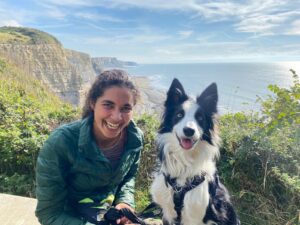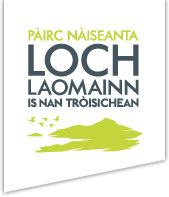
Green careers can make dreams come true!
To mark Green Careers Week, we chatted to Land Use Adviser Molly Vasanthakumar about her “dream job at the National Park”.
The Draft National Park Partnership Plan vision for 2045 is for Loch Lomond & The Trossachs National Park to be a ‘climate-resilient place where people and nature thrive together’’.

To do that involves tackling the nature and climate crises, and we know it’s going to take a huge team effort across a wide variety of sectors and partners from land management to tourism and public sector and community organisations. Here, now, all of us.
We know that this will not be easy, but the benefits for nature, climate and people will enable a better future for us all, from mitigating the impacts of climate change, to increased and more diverse employment opportunities – for example, Green Careers Week recently shared that green jobs are expected to increase nationally by 600% to more than 2 million jobs by 2050.
With green jobs and skills playing an essential role in the successful delivery of the National Park Partnership Plan, we talked to Molly Vasanthakumar from the National Park Authority’s Nature and Land Use Team about what drives her to use her skills to benefit nature:
How long have you been working with the National Park & what does your role entail?
I have been working at the National Park since June 2023 as a Land Management Adviser within the Nature and Land Use team, which means I work with land managers to discuss things that help will help restore nature, like managing the impact of deer and other animals through herbivore management and to develop and implement nature restoration projects including woodland creation, creating new woodlands. I am also working on plans to deliver our Trees and Woodland strategy, and to work on project that tackle the negative impact invasive species like Rhododendron can have on nature across the National Park.
You previously worked as a vet, what made you want to change direction?
I grew up surrounded by agriculture, my dad was a stockman on a dairy farm and then went on to raise sheep and goats. My upbringing was what inspired me to become a vet but as I went through my years of education, I felt that I was drawn back to farming and nature. My dad was going through a lot of changes on his farm, moving away from livestock to grow vegetables on an agroforestry system. This was what really inspired me to consider the possibility of changing my path too.
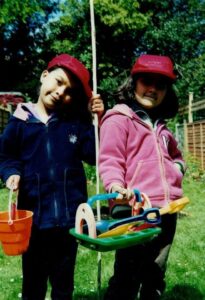
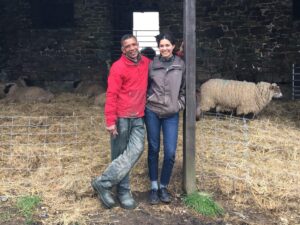
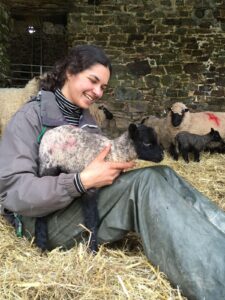
(Pictures l-f: Molly ready to work on the land from a very young age!, with her Dad on the family farm, cuddling a lamb.)
After working as a vet for the Donkey Sanctuary in Devon, I studied a Masters in Sustainable Food and Natural Resources at the Centre for Alternative Technology in Wales. As I was studying, I went back to farm work, initially on an organic vegetable farm in Devon, and then on a family-run salad farm in the Wye Valley. Once I graduated, I had a brief stint as a small animal locum vet, which reaffirmed that veterinary wasn’t the right profession for me!
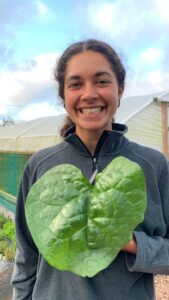
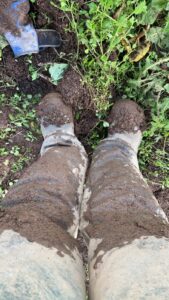
(Pictures l-f: Molly admiring nature, and enjoying muddy farm work!)
I knew that land management was what I wanted to get into but knew that there might be a few steps before I could reach that goal. I spent a year as a grant writer for an environmental justice charity before I secured my dream job at the National Park.
Has the work met your expectations?
Definitely. Land use is a rapidly changing world, so it feels exciting to be working on something so topical, with a real potential to make positive change in the world. Nothing brings me more joy than being outdoors growing food, so I am lucky that my job is balanced by getting to go back home every now and then to get put to work in the fields!
What are you looking forward to working on in future?
The future of agriculture and nature conservation in terms of policy and support is currently in a period of change. Therefore, as a team we are considering how best we can support land managers to engage in land use practices that produce food, support and enhance biodiversity, mitigate climate change, and provide spaces for recreation, whilst building their financial resilience. This may include projects that provide individual support on soil health or woodland creation, and creating a community or collaborative of land managers that are interested in developing nature restoration projects at scale. I am excited to continue to learn from my team, and from the inspiring farmers within the Park, and put my experience to use.
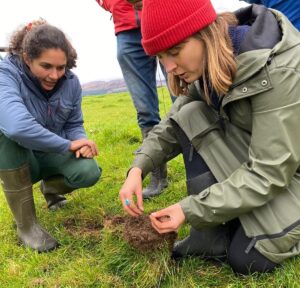
(Picture:Molly learning about soil health on the job in the National Park.)
What would your advice be to anyone considering following a green career path?
I would advise anyone to be open to change, whether that is change in the world around you, a change in your career, or even a change in your mindset. I think society wants us to choose who we are very early on in life, and it is very important to stay curious, to hear everyone’s opinions, and to constantly seek out new experiences. Burnout is rife in the rural sector, and so ensure that you continue to find joy in the small things, and don’t try to save the world on your own!
